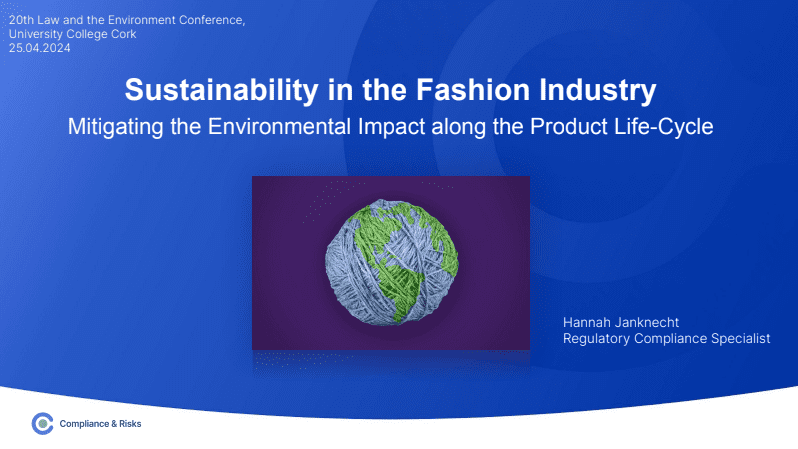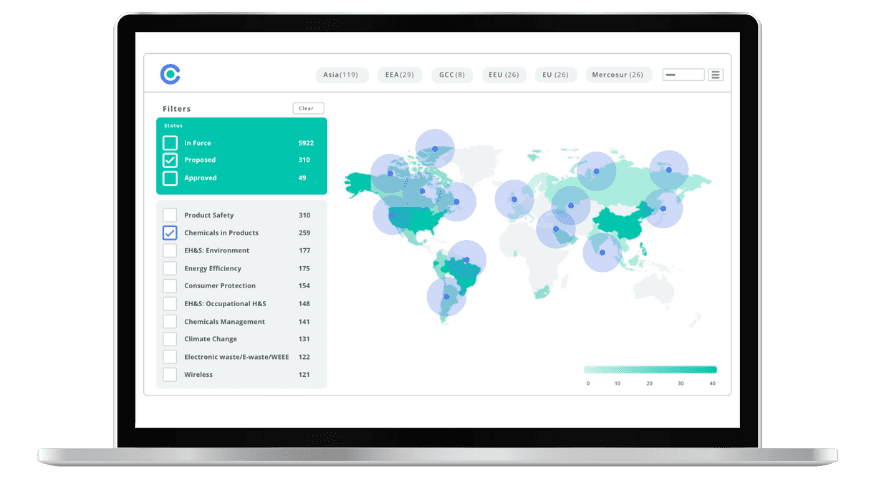
Key Takeaways from the UCC Law and the Environment Conference 2024

This blog was originally posted on 30th April, 2024. Further regulatory developments may have occurred after publication. To keep up-to-date with the latest compliance news, sign up to our newsletter.
AUTHORED BY HANNAH JANKNECHT, REGULATORY COMPLIANCE SPECIALIST, COMPLIANCE & RISKS
Introduction: UCC Law and the Environment Conference 2024
The 20th Law and the Environment Conference took place on 25 April 2024 at University College Cork (UCC) in Ireland. The annual conference, organized mainly by the UCC School of Law, provides a forum for the discussion of a vast array of topics in the field of environmental law, regulation and policy and enables an exchange between researchers, practitioners and civil society organizations.
This year’s overarching theme was the ‘Rights, Remedies and Restoration in Environmental and Natural Resources Law’. A broad panel of experts presented insights from research and practice on the new nature restoration law, planning law, industrial emissions directive, corporate social responsibility and circular economy.
In this blog, we discuss the key takeaways from the UCC Law and the Environment Conference.
Compliance & Risks Insights on Sustainability and Circular Economy in the Textiles Industry
As part of the panel on ‘Transnational Environmental Law’, Hannah Janknecht, Regulatory Compliance Specialist at Compliance & Risks, presented on Sustainability in the Textiles Industry. Her presentation explored the environmental impact of textiles along their life-cycle and looked into the vast amount of regulations that are currently coming out in this field. The main focus lay on the new EU regulations, most of which are based on the EU Textiles Strategy that was published in 2022.
As part of the life-cycle stage relating to material sourcing and ethical labor, the presentation looked into the Draft Corporate Sustainability Due Diligence Directive (CSDDD), which has just been adopted by the European Parliament on 24 April 2024, as well as the implications of the EU Deforestation Regulation for leather products.
Furthermore, with regard to the design and manufacturing stage, the new Draft Ecodesign Regulation (also adopted by the EU Parliament on 23 April 2024) is absolutely crucial. Here, the presentation explored what is already known about the potential ecodesign requirements for textiles through preliminary studies published by the EU, as well as the outright ban for the discarding of unsold textiles that will become applicable two years after the entry into force of the regulation.
Another important element of the regulatory changes applicable to the textiles industry concerns the EU’s plan to regulate green claims through enhanced consumer protection and competition law and the Green Claims Draft Directive. These developments will have a strong impact on the fashion industry, where marketing campaigns and branding have always been a big driver of success. As part of the proposed Green Claims Directive, the EU aims to make the substantiation and verification of green claims mandatory, and also works on reducing the vast amount of ecolabels that are currently in use. In the same context, a Bill proposed in France in March this year aims to ban all advertisements for fast fashion in the country.
Last but not least, the presentation looked into potential improvements of waste management of textiles and explored the impact of extended producer responsibility, the proposed Member State obligation to introduce separate waste collection systems for textiles and the effects of ecodesign for an improved recyclability of garments.
With regard to the broader context of corporate social responsibility, the panel on Transnational Environmental Law looked into the functions of voluntary labeling and certification schemes as well as the role of corporate social responsibility in environmental protection. The discussion around CSR highlighted the shift from formerly largely voluntary procedures to mandatory obligations for companies i.e. under the French Vigilance Law and examined its practical application based on a case brought by Ugandan NGOs against Total Energies and the East African Crude Oil Pipeline (EACOP).
Updates on the New Industrial Emissions Directive and Right to a Healthy Environment in the Clean Air Context
The wide coverage of the conference also allowed for an interesting discussion of environmental regulations related to industrial installations and air quality.
The panel led by Marie O’Connor from the Irish Environmental Protection Agency and Dr Noreen O’Meara, Associate Professor at the University of Surrey, delved into the latest developments in pollution regulation. The revised Industrial Emissions Directive, proposed in 2022 and adopted in April 2024, does not only bring large installations manufacturing batteries into the scope of the Directive, but it also introduces new penalties for non-compliance that must be implemented by the Member States in the next two years. While the previous Directive only required penalties to be effective, proportionate and dissuasive, Member states must now also ensure ‘administrative financial penalties that effectively deprive those that committed the infringement of the economic benefits derived from their infringements’. In addition, serious infringements shall be met with fines equaling at least 3 % of the operators annual Union turnover. This will severely increase the costs that corporations are facing in cases of non-compliance. In addition, the Directive will strengthen the requirements for permits especially with regard to water pollution, and requires Member States to introduce an electronic system for permits.
Amongst the many regulatory changes that were adopted in April 2024 is the new framework to improve air quality in Europe. The framework sets stricter limits for air pollutants and improves the access to justice for citizens across Europe. In this context, the panel provided insightful examples on air quality initiatives at the local level, reaching from London and Dublin to Berlin and Paris.
Stay Ahead Of Regulatory Changes
Accelerate your ability to achieve, maintain & expand market access for all products in global markets with C2P – Your key to unlocking market access, trusted by more than 300 of the world’s leading brands.
C2P is an enterprise SaaS platform providing everything you need in one place to achieve your business objectives by proving compliance in over 195 countries.
C2P is purpose-built to be tailored to your specific needs with comprehensive capabilities that enable enterprise-wide management of regulations, standards, requirements and evidence.
Add-on packages help accelerate market access through use-case-specific solutions, global regulatory content, a global team of subject matter experts and professional services.
- Accelerate time-to-market for products
- Reduce non-compliance risks that impact your ability to meet business goals and cause reputational damage
- Enable business continuity by digitizing your compliance process and building corporate memory
- Improve efficiency and enable your team to focus on business critical initiatives rather than manual tasks
- Save time with access to Compliance & Risks’ extensive Knowledge Partner network

ESG 2023: A Year in Review
Our whitepaper summarizes the ESG regulatory landscape in 2023, reviewing the key regulations proposed, published and/or entered into force.



